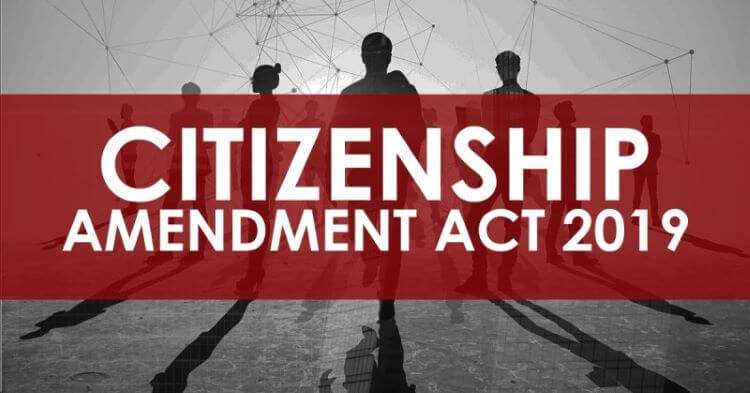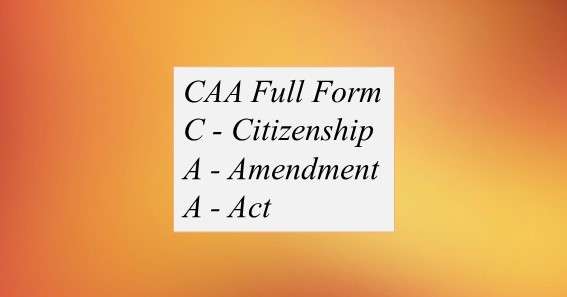The Indian Parliament enacted the contentious Citizenship Amendment Act (CAA) in December 2019. The bill updates the Citizenship Act of 1955 to offer non-Muslim immigrants who arrived in India from Afghanistan, Bangladesh, and Pakistan before December 31, 2014 a route to citizenship.
Many claim that the CAA is discriminatory and goes against the secular values of the Indian Constitution, and they have attacked it for these reasons. They contend that since Muslims predominate in each of the three nations specified in the law, it is discriminatory. They contend that the bill is not necessary since India already has a procedure in place to award citizenship to refugees.
What is the Full Form of CAA ?



The CAA has been challenged in court, and the Supreme Court is currently hearing a case on the constitutionality of the law.
What is the Objective of CAA?
| Objective | Description |
|---|---|
| Provide a pathway to citizenship for persecuted religious minorities from Afghanistan, Bangladesh, and Pakistan | The CAA modifies the Citizenship Act of 1955 to offer non-Muslim immigrants who arrived in India from these three nations before December 31, 2014, a route to citizenship. |
| Exclude Muslims from its purview | Muslims who entered India from these nations prior to December 31, 2014 are not covered by the CAA. As a result, the law has come under intense criticism for being discriminatory and going against the secular values of the Indian Constitution. |
| Challenged in court | The CAA has been challenged in court, and the Supreme Court is currently hearing a case on the constitutionality of the law. The outcome of the case is uncertain, and it is possible that the CAA will be struck down by the court. |
When was CAA introduced?
The establishment of the CAA was a turning point in Indian politics, with proponents seeing it as a way to save persecuted religious minorities and detractors raising issues with citizenship and secularism. Since then, the legislation has encountered legal issues, and discussions over its application and effects have continued in a number of places.
What is CAA Act 2019?



The CAA’s proponents contend that the measure is required to safeguard religious minorities in nearby nations. They contend that the CAA would give these minority a safe refuge in India because they are persecuted in their own countries. They further claim that because Muslims are not prohibited from seeking for citizenship, the statute is not discriminatory.
Key Features of CAA 2019
- It updates the Citizenship Act of 1955 to give non-Muslim immigrants who entered India from Pakistan, Bangladesh, or Afghanistan before December 31, 2014, a route to citizenship.
- Muslims who entered India from these nations prior to December 31, 2014 are exempt from the ordinance.
- Non-Muslim immigrants must demonstrate that they were persecuted in their native countries because of their religion in order to qualify for citizenship under the CAA.
- Many individuals have protested the bill, claiming it is discriminatory and goes against the secular values of the Indian Constitution.
- The measure has drawn a lot of opposition from people who say it is discriminatory and goes against the secular ideals of the Indian Constitution.
Key Provisions of CAA Bill 2019
The following are the main clauses of the 2019 Citizenship Amendment Act (CAA) Bill:
- A road to citizenship is provided by the law, which changes the Citizenship Act of 1955, for non-Muslim immigrants who entered India from Pakistan, Bangladesh, or Afghanistan before December 31, 2014.
- Muslims who immigrated to India from these nations before December 31, 2014, are not covered by the law.
- Non-Muslim immigrants must demonstrate that they have experienced religious persecution in their native countries in order to qualify for citizenship under the CAA.
- The measure has drawn a lot of criticism from those who claim it is discriminatory and goes against the secular values of the Indian Constitution.
- A case regarding the validity of the measure is presently before the Supreme Court and is being contested in court.
What is the difference between CAA and NRC?
| Feature | CAA | NRC |
|---|---|---|
| Purpose | To provide a path to citizenship for non-Muslim immigrants who came to India from Afghanistan, Bangladesh, and Pakistan before December 31, 2014. | To create a list of all citizens of India. |
| Scope | Applies to non-Muslim immigrants who came to India from Afghanistan, Bangladesh, and Pakistan before December 31, 2014. | Applies to all citizens of India. |
| Requirements | Applicants must prove that they are non-Muslim and that they have been persecuted in their home countries on the basis of their religion. | Applicants must provide documentation to prove their citizenship. |
| Implementation | The CAA has been passed by the Indian Parliament, but it has not yet been implemented. | The NRC has been implemented in Assam, and it is being considered for implementation in other parts of India. |
| Criticism | The CAA has been criticized for being discriminatory against Muslims. | The NRC has been criticized for being discriminatory against Muslims and for being a violation of the right to privacy. |






